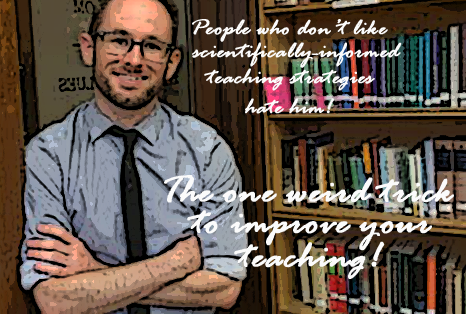Improve Your Philosophy Teaching With This One Weird Trick
What if I told you there was an easy, scientifically-proven, five-minute method for improving your teaching? Just five-minutes, and your teaching ratings go up. No, I’m not talking about giving your students candy when you have them fill out the course evaluation forms. I’m talking about an actual improvement in learning outcomes, based on real science. How much would you pay to learn it? $1,000? $5,000?
Not that much?
That’s what I thought. And it’s why I’ve decided to share this one weird trick with you for free. I’m not even going to make you watch a long conspiratorial video, or listen to a tedious presentation about time-share vacation homes. Here it is:
Take five minutes in each lecture to conduct a recap of key previously-covered material in which
- the students have to provide the content by answering questions,
- the material is presented in a varied way each time, and
- the purpose of the recap is explained to the students.
So says Dan Lowe (University of Colorado, Boulder), in his “Remembrance of Philosophy Classes Past: Why Cognitive Science Suggests that a Brief Recap Is the Best Way to Start Each Class Day,” recently published in Teaching Philosophy (alternative link).
The recap strategy is based on recent research in cognitive science. He writes:
Folk wisdom emphasizes the idea that mastery of content or skills involves “focused, repetitive practice of one thing at a time until we’ve got it nailed.” This strategy is what cognitive scientists call massed practice. Folk wisdom recommends massed practice as the key to learning in nearly every area of study: think of teachers who suggest repeated re-reading of texts as a study technique, clusters of the same sort of problem in mathematics textbooks, and the practice-practice-practice approach of much training in sports.
However, cognitive science shows that massed practice is among the least effective techniques for long-term learning. What, instead of massed practice, does cognitive science recommend?… an authoritative synthesis of recent findings shows that practice is far more effective when it is (1) spaced out over time, (2) interleaved with other learning, and (3) retrieval-based rather than re-exposure-based.
Lowe explains these ideas in the article, with several interesting tidbits throughout (e.g., “practicing something once you’ve gotten a little rusty is far more effective in the long term than practicing while it is still fresh”). Worth checking out.
(via Kate Norlock)



I think Lowe’s *method* for recapping is important. He requires students to be active (by providing the content); he explains the importance of the review to students, and her varies content.
When I taught logic for the first time at the University of Washington, I began each lecture with a five-minute recap of the previous lecture. About 10 (of 200) students complained about these recaps on the student evaluations. Because many students write little on evaluations, those complaints were enough to make me change the way I review previous class material. Many students were bored, even those who hadn’t yet mastered the material. They saw the material as sufficiently similar to what had been taught the previous class, and they checked out.
10 out of 200 students complaining about a teaching strategy is certainly compatible with that strategy being an effective one.
I’m not sure what to say about the being bored part.
Make it fun!
Buy a box of Halloween candy and give rewards for excellent answers.
I’ve always been a sort of “pick up where we left off” teacher and I’m honestly not sure where I picked up this habit. Maybe it just seemed to make sense at the time when I started teaching. When I think about my undergrad philosophy classes, there was always some sort of recap; when I took Manfred Frings’ “Values and Persons” class, he would spend about 20 minutes of a 50 minute class going over past material. As he would say, “repetition is the mother of all learning.” I am not sure we liked it, but we understood why it was important even then.
Prof Frings’ approach might be on the extreme end, but I will definitely be incorporating recaps into my classes this semester.
That’s Dan Lowe (Michigan) as of now!
https://lsa.umich.edu/philosophy/people/faculty/danlowe.html